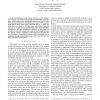Free Online Productivity Tools
i2Speak
i2Symbol
i2OCR
iTex2Img
iWeb2Print
iWeb2Shot
i2Type
iPdf2Split
iPdf2Merge
i2Bopomofo
i2Arabic
i2Style
i2Image
i2PDF
iLatex2Rtf
Sci2ools
111
click to vote
INFOCOM
2007
IEEE
2007
IEEE
On the Stability-Scalability Tradeoff of DHT Deployment
— Distributed hash tables (DHTs) provide efficient data naming and location with simple hash-table-like primitives, upon which sophisticated distributed applications can be built. DHT users provide free but unstable peer-to-peer (P2P) capacity. With stable DHT nodes being relatively scarce, a DHT can either rely on a small set of stable nodes with limited collective capacity, or a larger set of potentially less stable nodes and suffer maintenance and data redundancy overhead. In this paper, we provide an analytical model that captures the tradeoff between the stability and the scalability in DHT-based P2P systems. We use the model to demonstrate that the DHT throughput can be optimized through careful engineering of DHT node selection and data redundancy parameters.
| Added | 03 Jun 2010 |
| Updated | 03 Jun 2010 |
| Type | Conference |
| Year | 2007 |
| Where | INFOCOM |
| Authors | Chih-Chiang Wang, Khaled Harfoush |
Comments (0)

